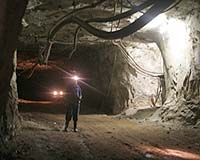March 29, 2013
March 24, 2013
Niger Uranium Mine Workers Stage ‘Indefinite’ Strike
Published on Sunday March 24 2013 (AEST)


More than 600 people working at a Chinese-operated uranium mine in northern Niger on Thursday began an “indefinite” strike action to protest their working conditions, a union official said.
Union spokesman Alassane Idrissa told AFP that after having staged an initial 72-hour cautionary strike, the action on Thursday rolled into an “indefinite” protest to demand “better life and working conditions” for the Niger staff at the Azelik site which is exploited by China National Nuclear Corporation (CNNC). Idrissa said that despite several agreements CNNC had for four years postponed improved conditions for its workers and has delivered “nothing concrete”.
One of the protesters' key demands concerns benefits enjoyed by other mining workers in the region, and which Idrissa said are inscribed in Niger's rule of law. He also accused CNNC of “paying no respect” to neither the environment nor the health of its workers, whom he said “are exposed to radioactivity”.
In 2012, CNNC extracted 200 tons of uranium from the Azelik mine, located 200 kilometres from the industrial town of Arlit. Niger is the world's third largest uranium producer, but the landlocked sub-Saharan country's remains one of the world's least developed nations. - Sapa-AFP
.
.
March 20, 2013
Strike Begins At Chinese Uranium Mine In Niger
Published on Wednesday March 20 2013 (AEST)
Workers at a China National Nuclear Corporation (SinoU) uranium mine in northern Niger have gone on a 72-hour strike, trade union officials say.

On Tuesday, Boubacar Mamane, a spokesman for the Syntramines labor union, said 680 workers at SinoU have gone on strike to demand better wages and bonus payments, Reuters reported.
"Management refused to pay our allowances and production bonus despite having promised to do so last year. If nothing is done, we will launch an unlimited strike," Mamane said.
SinoU officials and the Nigerien government, which owns 33 percent of the mine, were not available to comment on the action. SinoU and its partners have a majority stake in the 700 ton-per-year SOMINA mine.
Production at the mine kicked off in 2011 and is expected to increase to 2,500 tons annually in 2015. SinoU and its partners have a majority stake in the 700 ton-per-year SOMINA mine, whose production kicked off in 2011 and is expected to increase its output to 2,500 tons annually in 2015.
In 2007, SOMINA was established 160 kilometers southwest of Arlit and 150 kilometers northwest of Agadez, in the Agadez region of northern Niger.
Niger is the top supplier of uranium to the nuclear power industry of France.
.
.
March 12, 2013
Uranium Players Welcome Barnett West Australian Election Win
Published on Tuesday March 12 2013 (AEST)

The WA uranium industry has welcomed the re-election of Colin Barnett's Liberal Party, saying the results ended months of nervousness over Mark McGowan and Labor's commitment to stop any new uranium mines in the State.
In what was in many ways a forgotten element of the Saturday's State election, the Liberals' re-election ensures the viability of WA's fledgling uranium sector as a number of projects push towards development. There are no operating uranium mines in WA and proponents continue to face substantial headwinds, not least from a weak uranium price.
The spot price for the nuclear fuel is at $US42 a pound levels, having failed to recover since being devastated by Japan's Fukushima disaster two years ago. Toro Energy's Wiluna project - the most advanced in the State - would have survived Saturday's election after receiving government approval in October. Toro managing director Vanessa Guthrie said although her company's project was safe, there was a general sense of nervousness among investors regarding the WA election. Dr Guthrie said the re-election of the Barnett Government provided a sense of reassurance in an already testing market.
"It gives predictability and more certainty for projects that are in the pipeline and coming after Wiluna," Dr Guthrie said. "You've always got to look at the future markets. And as Cameco and Paladin (Energy) have said the uranium price doesn't meet the incentives for new production. So this signal to the international market - that WA is ready and open for business - is very significant." Toro is awaiting a decision on the Wiluna project from Federal Environment Minster Tony Burke, due by the end of this month.
The sentiment surrounding Mr Barnett's victory was echoed by the Australian Uranium Association. Chief executive Michael Angwin said uranium companies could now get on with the business of developing their projects.
.
.
March 11, 2013
Cameco Says Chairman Zaleschuk to Step Down at Annual Meeting
Published on Monday March 11 2013 (AEST)

Cameco Corp. (CCO), the world’s third- largest uranium producer, said Chairman Victor Zaleschuk will step down at the company’s next annual meeting.
A. Neil McMillan, a member of the Canadian company’s board of directors since 2002, will replace Zaleschuk, Saskatoon, Saskatchewan-based Cameco said today in a statement. Zaleschuk will continue to be a director, if re-elected at the May 14 meeting, the company said.
“It’s time for me to step down as chair to assure healthy renewal of board leadership,” Zaleschuk, who served as chairman for a decade, said in the statement. The change comes as the uranium industry grapples with depressed prices for the nuclear reactor fuel component following meltdown of three reactors in Japan after the March 2011 earthquake and tsunami.
The move also comes as Cameco prepares to begin output from its Cigar Lake uranium mine in Saskatchewan, a projected delayed by a series of underground floods beginning in 2006.
.
.
Subscribe to:
Posts (Atom)
 Australian Uranium News - Research
Australian Uranium News - Research

